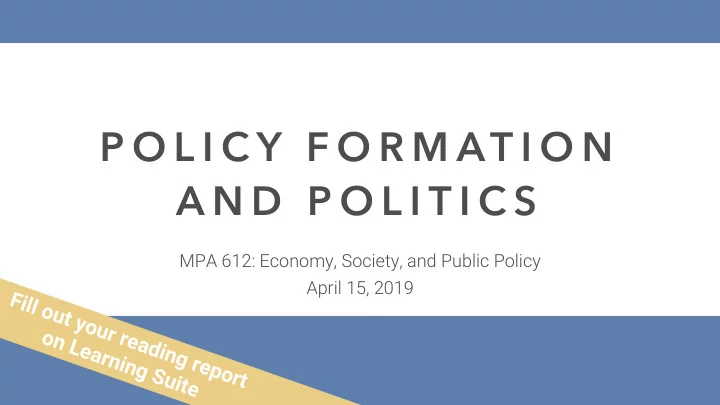

P O L I C Y F O R M AT I O N A N D P O L I T I C S MPA 612: Economy, Society, and Public Policy April 15, 2019 Fill out your reading report on Learning Suite
P L A N F O R T O D A Y The policy making process Factions and republics Small factions and public goods Why care about politics in public administration?
T H E P O L I C Y M A K I N G P R O C E S S
Identify a social goal Diagnose the problem Identify the appropriate institution for action Evaluate the substance and politics of competing options Implement, enforce, and Charles Wheelan, monitor the policy change Introduction to Public Policy
Verify, define, and detail the problem Establish evaluation criteria Identify alternative policies Evaluate alternative policies Display and distinguish among alternative policies Patton, Sawicki, Monitor and evaluate and Clark, Basic Methods of Policy the implemented policy Analysis and Planning
FAC T I O N S A N D R E P U B L I C S
F E D E R A L I S T # 1 0 Factions = bad Fix factions by removing their causes… …or minimize their effects Bigger republic = more competition = better
“ Extend the sphere , and you take in a greater variety of parties and interests; you make it less probable that a majority of the whole will have a common motive to invade the rights of other citizens ; or if such a common motive exists, it will be more difficult for all who feel it to discover their own strength, and to act in unison with each other.”
P R O B L E M S W I T H A R G U M E N T Constitutional system empowers minorities; provides veto points Pre-Bill of Rights Assumes factions will never get big Assumes multiparty system Duverger’s law: plurality-rule elections + single-member districts = two parties
https://historyshots.com/collections/political-financial
Minorities have inordinate power in democracies because of the dynamics of small groups CAVEAT : Minorities ≠ marginalized groups Minorities with access to political system have inordinate power Better term = interest groups
S M A L L FAC T I O N S A N D P U B L I C G O O D S
W H Y D O W E N E E D F A C T I O N S ? “[I]ndividual, unorganized action will either not be able to advance that common interest at all, or will not be able to advance that interest adequately” Mancur Olson, The Logic of Collective Action , p. 7 “Never doubt that a small group of thoughtful, committed, citizens can change the world. Indeed, it is the only thing that ever has.” Margaret Mead
Have you ever contributed to or volunteered in a national political campaign? Why did you donate or volunteer? How much did you benefit personally from that donation or from the outcome? How much did the group benefit from your work?
Individual gains in large groups are essentially zero Why would a rational, self-interested person donate to a national campaign or join a union or support activist causes?
G R O U P I N T E R E S T S = P U B L I C G O O D S Achievement of goals = nonexcludable and nonrivalrous “The achievement of any common goal or the satisfaction of any common interest means that a public or collective good has been provided for that group” Mancur Olson, The Logic of Collective Action, p. 15 Free riding!
W H O S U P P L I E S G L O B A L O R D E R ? Pax Britannica Pax Americana Pax Sinica? How does this make hegemonic powers feel?
Have you ever contributed to a city-level (or lower!) political campaign? Have you tackled a single issue with a city council?
You get individual benefits if you believe your marginal actions will lead to actual change Small groups can harness this Benefits can be excludable Little free riding = more power (Madison was right!)
How do large groups fix public goods problems (and stop free riding) ?
Change individual calculus Coercion Increase the costs of not acting Selective incentives https://benefits.nra.org/ Increase the benefits of acting Federation Make big group feel small
Coercion Increase the costs of not acting Selective incentives Increase the benefits of acting Federation Make big group feel small Governments? Political campaigns? Unions? Advocacy groups? Nonprofits?
W H Y C A R E A B O U T P O L I T I C S I N P U B L I C A D M I N I S T R AT I O N ?
Small groups can be too powerful Madison’s solution = use big groups The larger the group, the less it will further common interests oh no
Concentrated interest groups vs. large latent groups Narrow special interests and passionate minorities can unduly influence policy Concerned citizens (even if passionate!) are stuck with free riders
L O B B Y I S T S
Who are politicians responsive to?
https://www.youtube.com/watch?v=AgzCXbSLKMI
Model legislation
Is it okay that small groups wield substantial power? What can we do about it? (or should we do anything about it?) What does this mean for democracy? What does this mean for public administration?
Recommend
More recommend